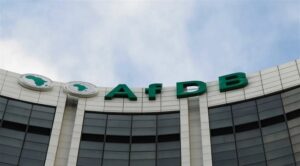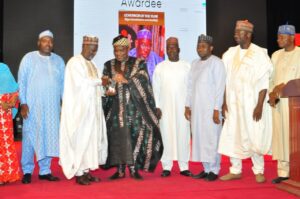
FG records optimum growth in the year 2022 within the nation’s agricultural value chain
Olaseinde Gbenga, Abuja
Year 2022 represents a milestone in the Agricultural industry of Nigeria, as the sector recorded a significant growth in Q1, Q2, and Q3 GDP report, as published by the National Bureau of Statistics (NBS).
According to NBS, it said, the industry developed by 3.16 per cent (year-on-year) in real terms in the first quarter of 2022, a decrease of 0.42 per cent points from the preceding quarter which recorded a growth rate of 3.58 per cent. The sector grew by 11.55 per cent year-on-year in nominal terms in Q1 2022, showing a fall of 3.59 per cent points from the same quarter of 2021 and contributed 22.36 per cent to overall GDP in real terms in Q1 2022, higher than the contribution in the first quarter of 2021 and lower than the fourth quarter.
It read further; Nigeria’s Agriculture sector grew by 1.20 per cent (year-on-year) in real terms for the second quarter of 2022, a decrease of 1.96 per cent points from the preceding quarter which recorded a growth rate of 3.16 per cent and also a decrease of 0.10 per cent points from the corresponding period of 2021.
The industry grew by 3.54 per cent (year-on-year) in real terms in the second quarter of 2022, showing an increase of 0.44 per cent points relative to 3.11 per cent in Q1 2022. It also grew by 13.83 per cent year-on-year in nominal terms in Q2 2022, showing an increase of 7.47 per cent points from the same quarter of 2021.
Also, in the 3rdquarter of 2022, there is an increase of 0.14 per cent points from the preceding quarter, which recorded a growth rate of 1.20 per cent as Nigeria’s gross domestic product (GDP) grew by 2.25 per cent year-on-year in Q3 2022, marking the slowest growth since the COVID-19.
The Minister of Agriculture and Rural Development (FMARD), in his keynote adddress at the opening ceremony of the 45th Regular Meeting of the National Council on Agriculture and Rural Development (NCARD) in Jos, said the Agriculture sector contributed 23 per cent to the nation’s Gross Domestic Product (GDP) in the first half of 2022. The Minister of Agriculture and Rural Development,
Dr Mohammad Abubakar, in his key note address at the opening ceremony of the 45th Regular Meeting of the National Council on Agriculture and Rural Development (NCARD) in Jos stated that the sector topped the chart in a survey of seven sectors identified to have contributed to Nigeria’s economy.
According to him, agriculture outperform six other sectors comprising trade, telecommunications, manufacturing, oil and gas, real estate as well as finance and insurance noting that the data reflects the impact of the implementation of programmes and projects in the Agricultural sector despite the security challenges in the country. The improve on performance also brought the strengthening of the linkage between research, agricultural and industry by intensifying our commodity value chain development process..
Speaking on it achievements, the Minister said about 3.6 million indirect jobs have been created from $1.113 billion (about N461.9billion) worth of externally funded projects being implemented by the Muhammadu Buhari-led government.
Mohammed Abubakar, disclosed this while featuring on the Ministerial Media Briefing organized by the Presidential Communications Team at the Presidential Villa, Abuja.
The Minister said $538 million was approved for special agricultural processing zones to support inclusive and and sustainable agricultural development in Nigeria.
Abubakar further stated that another project worth $575 million is being implemented to improve rural access and agricultural marketing in participating states while strengthening the financing institutional base for effective development, maintenance and management of rural roads network.
He gave the participating states as Akwa Ibom, Bauchi, Kano, Katsina, Kogi, Kwara, Kebbi, Ogun, Ondo, Oyo, Plateau and Sokoto.
In the year 2022, the Federal Government also established a panel to ensure the effective delivery of donor-funded agricultural projects across the country being implemented under the Federal Ministry of Agriculture and Rural Development.
At the inauguration held in Abuja, the Minister of Agriculture and Rural Development, Mahmood Abubakar, said the functions of the National Steering Committee on donor-funded projects would help to actualise the approval of the annual work plan and budget of the projects adding that the inauguration marked a significant milestone in the implementation of development partner support projects in the agricultural sector.
According to him, “Over the years, projects have been without steering committees, making it difficult to effectively track their performance especially, the approval and monitoring of Annual Workplan and Budget, which is the core responsibility of the steering committee as contained in the project appraisal document of all the projects.
Also, the Federal Government launched the National Strategic Documents for the Control of Transboundary Animal Diseases (TADs) to eradicate Animal and Zoonotic Diseases in a bid to address the challenges bedeviling the Livestock Sector.
Speaking during the event that took place at the Banquet Hall, State House, Abuja, recently, the Vice President of Federal Republic of Nigeria, Prof. Yomi Osinbajo, represented by the Minister of Health, Dr. Osagie Ehanire said that Transboundary Animal Diseases were among the most economically devastating Diseases of Livestock in the West and Central Africa Sub-Region.
He pointed out that it was responsible for more than N29 billion losses annually in the Livestock Sub-Sector, through mortality, morbidity and trade restrictions on Nigeria occasioned by the endemicity of some of these Diseases in Nigeria.
He stated that the Federal Government through Ministry of Agriculture and Rural Development in collaboration with relevant stakeholders in other MDAs, were at the forefront of coordinating the fight against diseases that afflict animals.
In his words “Intensive surveillance, epidemiology and response are being conducted in the hotspot areas, to keep the rising profile of the diseases in check. We work also in collaboration with State Veterinary Services, particularly in frontline international borders. In addition, mass vaccinations against economically devastating diseases are carried out annually for millions of cattle, sheep, goats dogs, etc.”
However, in a bid to produce a new National Animal Feed Policy Document, the Federal Ministry of Agriculture and Rural Development also embarked on the review of the existing policy with a view to achieving the desired roadmap for animal feed and militate the challenges against animal feed sector in Nigeria.
While speaking at the event that took place at Agricultural and Rural Training Institute, ARMTI, Gudu, Abuja, recently, the Permanent Secretary, Federal Ministry of Agriculture and Rural Development, Dr. Ernest Umakhihe represented by the Director Special Duties, Mrs. Fausat Lawal said that the review was aimed at providing a draft document ahead of the forthcoming 2nd Animal Feed Summit.
He recalled that at the end of the 1st Animal Feed Summit that was held on the 23rd to 25th September, 2021 in Abuja, a draft Feed Policy document was developed.
Dr. Umakhihe stated that the Ministry had successfully conducted the 1st National Animal Feed Summit, with the theme “Developing a road map for Animal Feed Security in Nigeria”, adding that the summit attracted key stakeholders from policy, research and commerce arms of the feed industry and the broader livestock sub-sector.
He revealed that “critical issues were raised on the need to strategically develop a comprehensive feed sector database, harness crop residues to boost feed security and safeguard environment, Prioritize efforts and investment in harnessing alternative feed resources amongst others.”
Adding to it achievements in 2022, the Federal Government also collaborate with stakeholders to develop National Control Strategic plan on Transboundary Diseases in Livestock sub-sector.
Dr. Mohammad Mahmood Abubakar said that the Ministry in collaboration with the Relevant Stakeholders has developed a five years National Control Strategic Plans (NCSP), to curtail the spread of Transboundary Diseases in the Livestock Sub Sector in Nigeria.
Abubakar disclosed this at the Flag-Off Ceremony of the 2022 Nationwide Mass Vaccination Campaign against Transboundary Animal Diseases for the North-Central Zone in Abuja, recently.
He added that the plan would ensure improved animal production and productivity for sustainable livestock development in the Country.
Report also revealed that the Federal Ministry of Agriculture and Rural Development (FMARD) also throws support for local Production of organic fertilizer and as well sensitize farmers on provision of National Fertilizer Quality Control Act.
This advocacy came during a training workshop on Zonal Promotion of Organic Fertilizer and Use at the local level, using Eco-friendly Agricultural Technologies organised by the Department of Farm Inputs Support Services at Agric. Show Ground, Karu Local Government Area of Nasarawa State, recently.
In his speech, the Director, Mr. Muhammad Kwaido represented by the Assistant Director, Organic Fertilizer Quality Control, Mrs. Afusatu Babalola stated that the programme would provide an ample opportunity for increased advocacy for the use /adoption of organic fertilizer in Nigeria and to halt the current rejection of Nigerian produce in the International market.
In his words, “Nigerian farmers i believe are well prepared to adopt the use of organic fertilizers as the country is blessed with abundant raw materials such as plant residues, poultry, livestock waste, biogas residue and agricultural by-products that are readily available locally.”



